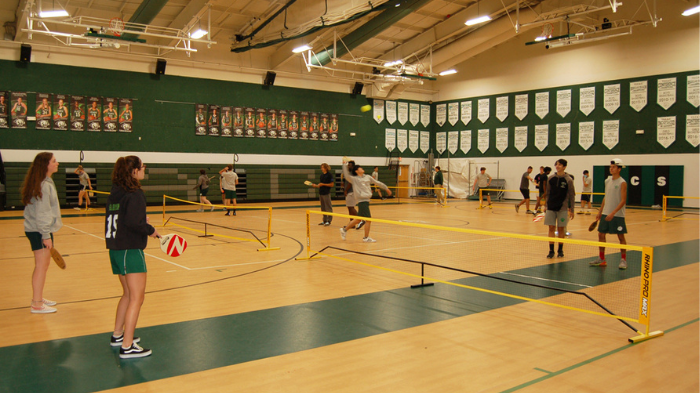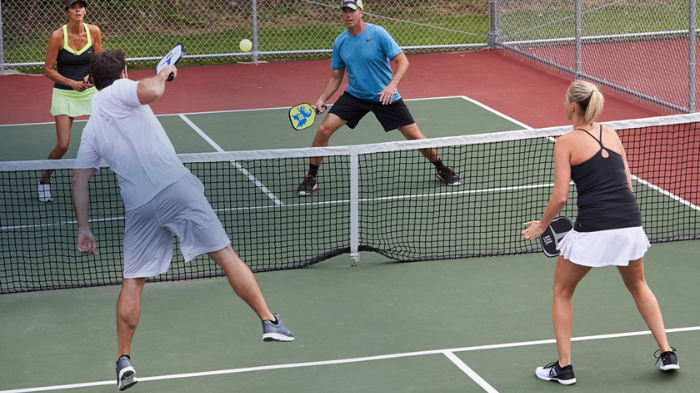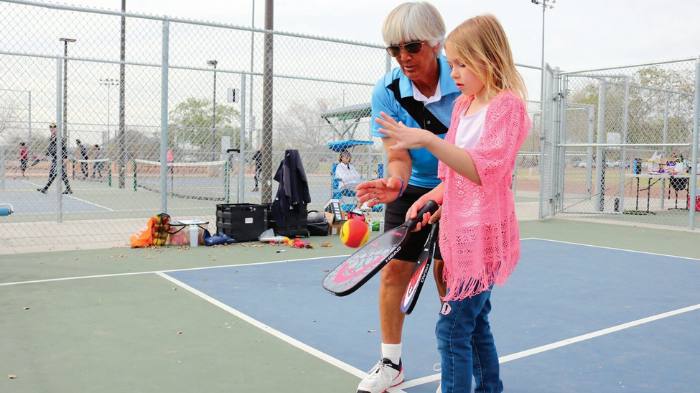Young people worldwide have embraced pickleball, a sport that was previously intended for older adults, leading to its global popularity. Now talking about the rise of young pickleball players worldwide, we are going to explain the reasons behind why the rise in young pickleball players in world in this blog post.
In this blog, we are also going to explain the benefits, challenges, and opportunities for young pickleball players in pickleball. Along with these, we are going to share some success stories of young pickleball players in this game and tips to parents and pickleball coaches of the young players for introducing the game to them. So let’s get started.
Reasons Behind Increase in Young Pickleball Players
There are several reasons behind the increase in young pickleball players in recent years. Here are some of the key factors contributing to the growing popularity of pickleball among the youth:
Accessibility And Ease Of Play: Pickleball is relatively easy to learn and play compared to many other sports. The rules are simple, and the smaller court size makes it less physically demanding than sports like tennis. This accessibility attracts young players who may be looking for a sport that is easy to pick up and play with friends or family.
Intergenerational Appeal: Pickleball’s intergenerational appeal has made it a favorite sport among families, allowing parents and children to actively engage in the game together. Its inclusive environment fosters a sense of unity and shared experiences by encouraging younger players to join and play alongside older generations, promoting a strong intergenerational bond.
The ability of pickleball to facilitate simultaneous participation among individuals of different age groups presents a distinct opportunity for bonding, ultimately contributing to the sport’s rising popularity among younger generations.
Active Aging Movement: Pickleball has gained significant popularity among older adults in recent years due to its low-impact nature and social aspects. As a result, younger players are exposed to the sport through their parents, grandparents, or other older family members who are actively playing pickleball. This exposure encourages them to try the sport themselves.
School And Community Programs: Pickleball has been introduced in numerous schools and community centers as part of their physical education programs or extracurricular activities. These initiatives aim to familiarize young individuals with the sport and offer them chances to learn and engage in pickleball. As a result, more young individuals are becoming familiar with pickleball and choosing to continue playing outside of school.

Professional And Media Exposure: The professional pickleball scene has experienced rapid growth, marked by televised tournaments and the recognition of professional players. The sport has gained significant exposure through increased media coverage, including online streaming and social media platforms.
This heightened visibility has played a crucial role in raising awareness of pickleball among young people. Watching skilled players in exciting matches can inspire young individuals to enthusiastically take up pickleball and strive for excellence in the sport.
Social And Recreational Benefits: Pickleball is a social sport that fosters community and connections. The friendly and inclusive atmosphere on the pickleball courts attracts young players who enjoy the social aspect of the game. Additionally, pickleball can be played both competitively and recreationally, providing options for players of varying skill levels and preferences.
The overall growth and increased visibility of pickleball as a sport, along with these factors, have played a significant role in the surge of young pickleball players. As more and more young individuals discover pickleball’s fun and inclusive nature, its popularity among youth is expected to keep rising.
Benefits of Pickleball for Young Pickleball Players
Pickleball offers several benefits for young players, both physical and social. Here are some key advantages of pickleball for young pickleball players:
Physical Fitness: Pickleball provides a great cardiovascular workout and improves overall fitness. The game of pickleball involves constant movement, quick reactions, and agility, which can help young players to enhance their endurance, coordination, and balance. Regularly playing pickleball can assist in developing their strength and stamina over time.
Low-Impact Sport: Pickleball is a sport that places less stress on your joints and muscles in comparison to high-impact activities like basketball or running. This makes it a fantastic option for young players who may be more susceptible to injuries or have physical limitations. By providing a safer and less demanding alternative, pickleball reduces the risk of injuries and minimizes physical strain for young players.
Hand-Eye Coordination: Pickleball requires players to track the ball, react quickly, and make precise shots. These actions enhance hand-eye coordination and improve motor skills, which can have positive effects on other sports and activities.
Social Interaction: Pickleball is a social sport that encourages interaction and teamwork. Young players can expand their social circles, form friendships, and cultivate essential social skills through pickleball. Engaging in team play or participating in doubles matches fosters effective communication, collaboration, and good sportsmanship.

Inclusive And Accessible: Pickleball’s smaller court dimensions and slower pace, in comparison to other racket sports, increase its accessibility for young players. The sport welcomes players of all skill levels, allowing beginners to get involved and enjoy the game quickly. This inclusivity fosters a supportive and welcoming environment for young players.
Family Bonding: The appeal of pickleball to individuals of different age groups allows young players to actively engage in the sport alongside their family members, creating a shared experience across generations. This inclusive nature creates valuable opportunities for quality family time, strengthens relationships, and promotes a profound sense of unity among all players involved.
Mental Benefits: Pickleball requires strategic thinking, decision-making, and adaptability on the court. Young players develop valuable cognitive skills, such as game analysis, anticipating opponent’s moves, and making quick decisions while playing pickleball. These mental challenges improve their problem-solving abilities, concentration, and overall cognitive capabilities.
Challenges and Opportunities in Pickleball for Young Players
Pickleball, a fast-growing sport that combines elements of tennis, badminton, and table tennis, offers numerous challenges and opportunities for young players. Here are some of the key aspects to consider:
Challenges:
Skill Development: Skill development is crucial in pickleball, just like in any other sport. For young players, honing their hand-eye coordination, agility, footwork, and paddle control is essential. However, mastering the techniques and strategies of the game can be quite challenging for beginners.
Physical Fitness: Pickleball is a physically demanding sport that requires players to be quick on their feet, have good endurance, and maintain balance. Young players may need to work on their overall fitness level to meet the demands of the game. Also Know About pickleball sweaty hands solutions.
Competition: As pickleball gains popularity, the competition among players intensifies, posing a more significant challenge for young players. They can expect to encounter skilled opponents, making it more challenging to establish and sustain a competitive advantage. To achieve success, young players need to showcase dedication, maintain a consistent practice routine, and embrace the valuable lessons that come with experiencing defeats in the game.
Mental Toughness: Pickleball presents mental challenges, particularly in high-pressure situations. Young players must develop mental toughness, sharpen their focus, and cultivate the ability to handle stress and setbacks with resilience. Maintaining composure and making quick decisions during intense gameplay are essential aspects to master.
Opportunities:
Accessible Sport: Pickleball is known for its accessibility, making it an excellent opportunity for young players to get involved in a new sport. The smaller court size and slower pace in comparison to traditional tennis provide beginners with an opportunity to grasp the fundamentals quickly and derive enjoyment from the game.
Community And Social Interaction: Pickleball fosters a vibrant and inclusive community of players. Young players can connect with people of different ages and skill levels, fostering social interaction and mentorship opportunities. Participating in pickleball tournaments and clubs can help to develop lifelong friendships and networks.
Cross-Training Benefits: Pickleball incorporates elements from various sports, providing young athletes with cross-training opportunities. The skills acquired in pickleball have the potential to transfer to other sports like tennis, badminton, and table tennis, contributing to the enhancement of overall athletic abilities.
Growth Potential: The sport of pickleball is experiencing a remarkable surge in popularity, demonstrated by the construction of a growing number of courts and the organization of tournaments taking place across the globe. This gives young players an opportunity to shine and potentially pursue pickleball at a competitive level. As the sport evolves, new avenues for scholarships, sponsorships, and professional opportunities may emerge.
To capitalize on the opportunities and overcome the challenges in pickleball, young players should focus on regular practice, seek guidance from experienced coaches, engage in competitive play, and maintain a positive mindset. With dedication and perseverance, young pickleball players can develop their skills, enjoy the sport, and achieve their goals.
Success Stories of Young Pickleball Players
If you’re interested in hearing about the success stories of young pickleball players, we have two inspiring tales of individuals who have achieved remarkable success in pickleball at a young age. Please check out the success stories of two young pickleball players, named Anna Leigh Waters and Ben Johns, which are given below:
Anna Leigh Waters:
Anna Leigh Waters is an incredible young pickleball player who started her professional career when she was just 12 years old, making her the youngest pro in the sport’s history. She has worked incredibly hard and is highly talented. Anna Leigh has achieved extraordinary success, capturing an impressive tally of 10 triple crowns and securing six gold medals at the prestigious USA Pickleball Nationals tournament.
Anna Leigh Waters plays pickleball with her mom, Leigh Waters, as her partner. They are called the “Water Monsters” because they are very skilled. When Anna Leigh plays, she shows bravery and grace. She puts forth her best effort to win and never holds back against her opponents.
Ben Johns:
Ben Johns, the current top-ranked pickleball player globally, has emerged as a prominent figure in the sport. His pickleball journey began at 18 years old when his brother Colin Johns, who is also a professional player, introduced him to the game.
Ben Johns has achieved great success by winning multiple prestigious tournaments, including the US Open Pickleball Championships, the Tournament of Champions, and the Margaritaville USA Pickleball National Championships. On the court, he is renowned for his impressive combination of strength, finesse, and strategic prowess.
Pickleball, a game that brings joy to people of all ages, has showcased the remarkable talents of these young players who have proven their ability to compete at a top level. Their achievements inspire others to engage in this sport and discover their passion for pickleball. Even someone like Bill Gates, who happens to be a fan of pickleball, recognizes and acknowledges that the game has gained widespread popularity and grown significantly due to its accessibility. He believes that pickleball is remarkably easy to learn, but mastering it presents a whole new level of challenge.
Tips to Parents and Coaches for Introducing Pickleball to Their Young Players
Start With The Basics: Introduce the fundamental rules and techniques of pickleball to young players. Begin with an overview of the court, scoring system, and basic shots like the serve, dink, and volley. Keep the initial lessons simple and gradually build upon their skills to Hold A Pickleball While Serving.
Use Appropriate Equipment: Provide young players with age-appropriate pickleball paddles and balls. Junior-sized equipment is lighter and easier to handle, allowing young players to develop their skills more comfortably.

Make It Fun: Incorporate fun games and drills into pickleball sessions to keep young players engaged and excited about the sport. Use creative challenges, obstacle courses, and mini-tournaments to add an element of enjoyment to their learning process.
Emphasize Teamwork And Sportsmanship: Teach young players about the importance of teamwork and displaying good sportsmanship. Encourage them to support and cheer for their teammates and to show respect for opponents, officials, and the game itself.
Break It Down: Break down pickleball skills into smaller, manageable components. This approach helps the young players to understand and practice each skill individually before combining them. For example, focus on proper grip, footwork, and swing technique separately before integrating them into a full shot.
Provide Positive Reinforcement: Make sure to praise and encourage the young players when they show improvement or exhibit good sportsmanship. Offering positive reinforcement not only helps to build their confidence but also serves as a motivation for them to keep working hard.
Adapt The Game: It is essential to consider making appropriate adjustments to the rules or court size to effectively cater to the age and skill level of young players. You can create smaller courts, use lower nets, or adjust the scoring system to make the game more accessible and enjoyable for them.
Organize Friendly Competitions: Arrange friendly matches or mini-tournaments among young players to give them a chance to apply their skills in a competitive setting. Make sure that the focus remains on participation, fun, and learning rather than solely on winning.
Be Patient And Supportive: Understand that learning a new sport takes time and effort. Be patient with young players, offer constructive feedback, and provide support throughout their pickleball journey.
Lead By Example: Parents and coaches should set a positive example by showcasing enthusiasm and a genuine love for pickleball. By actively participating and demonstrating enjoyment in the game, they can inspire young players to develop a genuine interest and passion for pickleball.
Also Know: Can you play pickleball on asphalt?
FAQs
Yes, pickleball is a suitable sport for young children. It has smaller court dimensions, lighter equipment, and a slower pace compared to other racket sports, making it easier for young players to learn and enjoy the game.
Pickleball offers several physical benefits for young players, including improved cardiovascular fitness, agility, coordination, and strength. Regular play helps them stay active and develop their overall physical fitness.
Yes, pickleball is an inclusive sport that welcomes young players with disabilities. The sport can be adapted and modified to accommodate players of different abilities, ensuring that everyone can actively participate and enjoy the game.
Parents and coaches can support young players by providing guidance, encouragement, and opportunities for practice and play. They should focus on creating a positive and supportive environment, emphasizing enjoyment and skill development rather than just winning or competition.
Yes, pickleball requires precise hand-eye coordination as players need to track the ball and strike it with accuracy using their paddles. Regular play and practice enhance the hand-eye coordination skills of young players, which can also benefit them in other sports and activities.
Conclusion
The reasons behind why the rise in young pickleball players are it’s accessibility, intergenerational appeal, alignment with the active aging movement, prevalence in school and community programs, increased professional exposure, and the social and recreational benefits it provides. Pickleball provides young players with physical fitness, hand-eye coordination, social interaction, and mental benefits while promoting inclusivity and family bonding.
But there are some challenges and opportunities in pickleball for young players. We have shared the success stories of several exceptional young pickleball players that you can read and take inspiration from them. With the right guidance from parents and pickleball coaches, young players can thrive in pickleball and enjoy its numerous advantages.



